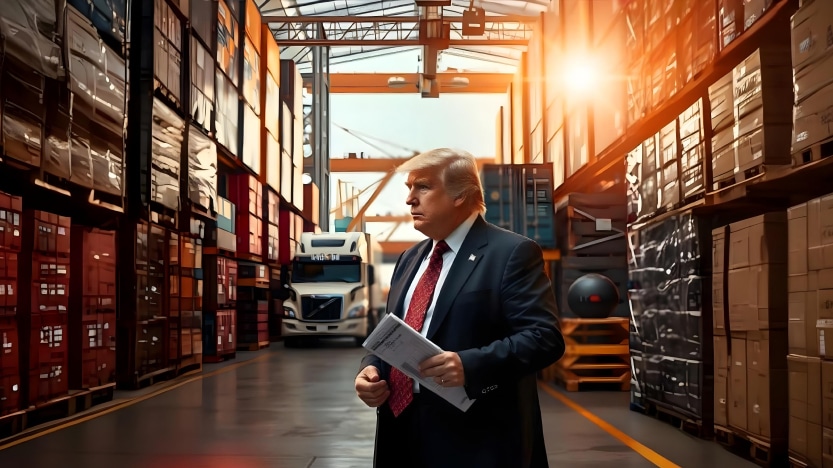The logistics industry, a cornerstone of the global economy, stands at a crossroads following Donald Trump’s victory in the 2024 U.S. presidential election. This outcome brings an expected reorientation in U.S. economic policies, ranging from energy and trade to regulatory shifts, each with deep implications for logistics and transportation sectors domestically and internationally. Below, we explore how Trump’s proposed policies on tariffs, energy, automotive logistics, and more could transform the logistics industry.
Energy Policy: Impact on Fuel Costs and Domestic Logistics
One of the most immediate impacts on logistics under Trump’s presidency will likely stem from his energy policy. Trump has consistently advocated for an energy policy centered around domestic oil production, often summarized by his “drill, baby, drill” approach. This emphasis on increasing oil output could drive down fuel prices, with analysts predicting oil prices could drop to as low as $40-$50 per barrel. Such a reduction in fuel costs would have wide-ranging effects:
- Domestic Trucking and Rail: Lower oil prices directly reduce operational costs for the trucking industry, boosting profitability and potentially lowering prices for consumers. Rail and intermodal services could also benefit from reduced diesel prices, making domestic transportation modes more competitive.
- Reduced Inflationary Pressure: Lower fuel prices could alleviate inflationary pressures on consumer goods, making it more affordable to transport goods across the country. A drop in inflation could, in turn, lead to lower interest rates, stimulating consumer demand and potentially increasing import volumes to meet this demand.
However, while cheaper fuel would be a positive factor for logistics within U.S. borders, Trump’s anticipated trade policies—specifically, tariffs on imports—could counterbalance some of these benefits, particularly for international shipping.
Tariffs and Trade Policies: Shaping Domestic and International Logistics
Trump has long advocated for high tariffs, particularly on Chinese goods, and has indicated that he would impose significant new tariffs on imports. The effects of such tariffs on logistics are likely to be multi-faceted:
Encouraging Domestic Production
Tariffs on imports are expected to push companies to reshore manufacturing operations to the U.S., creating new demands for domestic warehousing, transportation, and other logistics services. This shift could see an increase in jobs and infrastructure investment in logistics hubs across the country as manufacturers aim to reduce their dependency on foreign imports.
Restructuring Global Trade Flows
High tariffs may drive companies to near-source goods from countries like Mexico, particularly if they seek to sidestep U.S.-China tensions. However, Trump’s previous administration also demonstrated a readiness to scrutinize such trade flows under the USMCA agreement, potentially affecting goods sourced from Mexico if they are perceived as circumventing tariffs on Chinese products.
International Shipping and Freight
For international logistics providers, increased tariffs would likely dampen demand for shipping services from Asia. Higher tariffs on foreign goods make it costlier to import, reducing volume for ocean freight and potentially shifting demand toward more localized supply chains. Also, if Europe responds with retaliatory trade measures, transatlantic shipping could be affected, though regional logistics within Europe might benefit from increased self-sufficiency.
Short-Term Surge in Imports
To avoid tariffs, importers may expedite shipments ahead of their implementation, creating a temporary boom in shipping rates and demand. Once tariffs are in place, however, the need for international freight may decline, affecting companies reliant on high import volumes.
Automotive Logistics: Shifting Focus to Internal Combustion Engines
The automotive sector is another area where Trump’s policies are likely to have a notable impact. While much of the world, including Europe, has accelerated the transition to electric vehicles (EVs), Trump’s policies suggest a delayed timeline for EV adoption in the U.S.
- Increased Demand for Automotive Logistics: As Trump’s policies may favor continued production of internal combustion engine (ICE) vehicles over EVs, the logistics needs of the automotive industry could increase. ICE vehicles typically require a more intensive logistics network than EVs due to the complexity and number of parts involved, potentially driving up demand for warehousing, transportation, and other automotive logistics services.
- Potential Influence on Europe’s EV Transition: Trump’s stance could also indirectly impact European markets, where auto manufacturers might face added pressure if U.S. companies focus on ICE vehicles. If Europe faces challenges in meeting its EV targets, logistics providers in Europe could see a boost in demand related to ICE vehicles, delaying their own shift to EV logistics infrastructure.
Tax and Regulatory Changes: Stimulating Domestic Logistics Growth
Trump’s proposed tax cuts for domestic manufacturers, alongside significant regulatory rollbacks, could stimulate growth in the logistics sector:
- Corporate Tax Cuts: Trump has advocated for cutting corporate taxes, particularly for companies involved in manufacturing, R&D, and equipment. These incentives are expected to encourage domestic production, creating demand for logistics support in transporting raw materials, finished products, and equipment. This could also foster growth in warehousing and distribution centers, which are essential for a robust domestic logistics network.
- Reduced Regulatory Burden: Trump’s goal to eliminate regulations—aiming to abolish 10 regulations for every new one introduced—would reduce compliance costs for logistics companies, freeing up capital for expansion. This deregulation could be particularly beneficial for smaller logistics providers who often struggle with high regulatory compliance costs.
However, while deregulation might stimulate growth, it could also lead to challenges in standardizing practices across the industry, creating inefficiencies in international operations where regulatory compliance is more structured.
Climate Change Policy: Slower Transition to Green Logistics
Trump’s re-election suggests a reduced focus on climate change policies, especially as they pertain to logistics and transportation. This stance is likely to impact the logistics industry’s adoption of green technologies in several ways:
- Lower Emphasis on Carbon Reduction Initiatives: Without U.S. support for carbon reduction agreements, progress on international initiatives such as a global carbon tax could stall. Shipping lines and air cargo carriers may see lower operational costs without these taxes, allowing them to delay investments in eco-friendly technologies.
- Increased Reliance on Fossil Fuels: With a focus on keeping oil prices low, domestic trucking, which relies heavily on diesel, could benefit in the short term. However, this could delay the shift toward electric or hydrogen-fueled transportation options, potentially affecting the industry’s long-term competitiveness as global markets increasingly prioritize sustainable logistics.
Foreign Security Policy and Defense-Related Logistics
Trump’s foreign policy, particularly his stance on reducing military engagement abroad, could also influence logistics in several ways:
- Energy Prices and Middle Eastern Stability: If Trump’s foreign policy leads to greater stability in the Middle East, this could further drive down global oil prices, benefiting logistics by keeping transportation costs low. Conversely, if tensions increase, it could introduce new risks and costs.
- European Defense Spending: Trump’s skepticism toward NATO might prompt European nations to increase their defense budgets, potentially benefiting defense-related logistics services in Europe. Companies involved in transporting, warehousing, and managing defense supplies may see an uptick in demand as European nations prioritize self-reliance in defense.
Final Thoughts
Trump’s presidency stands to reshape logistics, with the biggest beneficiaries likely to be domestic logistics providers particularly those involved in trucking, warehousing, and intermodal services. His policies on energy, taxation, and regulation could lower operational costs, stimulate demand for domestic production, and ease inflationary pressures. However, the global logistics landscape may see mixed impacts: international shipping and air freight face challenges from potential tariffs, while Europe could experience a rise in regional logistics demand in response to strained trade relations.
The key unknown remains how long-term these shifts will be and how companies in the logistics industry will adapt. Some may benefit from short-term demand surges, while others may need to rethink their global strategies to navigate a potentially more fragmented international trade environment. Regardless, Trump’s policies will likely prompt logistics providers to innovate and adapt, positioning themselves to thrive in an increasingly complex and dynamic marketplace.

I’m Tammy Waller, a supply chain and logistics specialist with over 10 years of expertise. I’ve been an author and SFL employee for over 10 years.
As an author, I’ve been able to teach others. I love guiding users through supply chain and logistics operations.
I have substantial experience managing logistics operations, supply chain management, transportation, inventory management, and warehousing in shipping-moving and logistic services. I’ve worked on many worldwide logistics and supply chain projects, honing my abilities in negotiating rates, scheduling shipments, and managing vendors.



